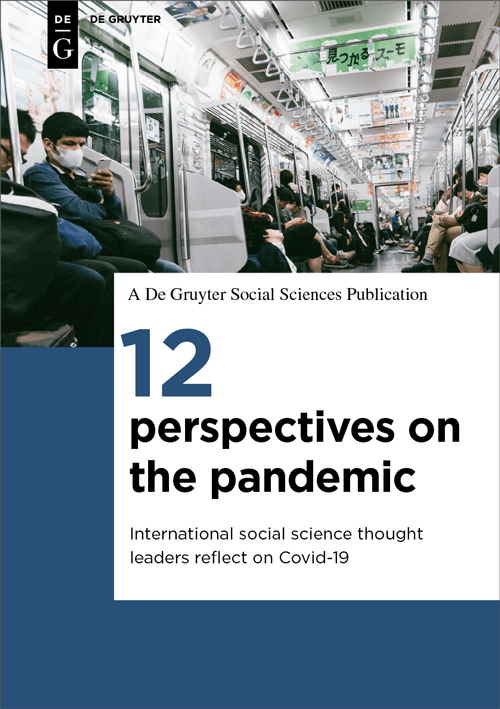Why Social Research is Urgently Needed in Times of Covid-19
Social research is urgently needed to detail people’s experiences of life during the pandemic, how different countries and governments are responding to the crisis and what social changes are happening.
This essay was first published in the free digital pamphlet 12 Perspectives on
the Pandemic: International Social Science Thought Leaders Reflect on Covid-19.
We are now living in a ‘Covid society’, the long-term effects of which have yet to be experienced or imagined. Everything has shifted. All social research, whether it is directly focusing on the pandemic or not, is also now inevitably changed.
Historical Health Crises
I have been studying the social aspects of health and medicine for my entire career. Among many other health-related topics, I have conducted research on two major global health issues that received major policy and public health as well as mass media attention. The first was the HIV/AIDS pandemic, which emerged in the early 1980s. The second was the so-called ‘obesity epidemic’, sparked by public health announcements and mass media reporting in the late 1990s and into the early 2000s. It proposed that levels of ‘obesity’ were rising dramatically worldwide, accompanied by major health problems. HIV/AIDS and the obesity crisis generated an enormous research momentum among not only social researchers but also social activists, community groups and artists, all of whom played a vital role in helping to understand the social, cultural, psychological and political consequences and impacts of these phenomena.
Now the Covid-19 pandemic has erupted, affecting all regions of the world, and the news media are dominated by reporting developments and effects. At the time of writing, more than 100 thousand lives have already been lost worldwide, and many healthcare systems are straining under the burden of caring for unprecedented numbers of seriously ill patients with pneumonia. Everyday lives have been disrupted: schools and workplaces are closed; many people have lost their jobs; vast populations have been confined to their homes; people are cut off from face-to-face interactions and worried about their own health or those of their family members.
Social Research for COVID-19
Social research is again urgently needed to document people’s experiences of living in this moment, how different countries and governments are addressing the pandemic and what social changes are occurring now or will be happening in the post-Covid world. Social researchers need to be contributing to understandings how people have been affected by living in the pandemic, both physically and mentally, and what measures and policies have been most effective and helpful.
“The current pandemic shares some features of the HIV/AIDS pandemic and obesity crisis, but there are many differences as well.”
The current pandemic shares some features of the HIV/AIDS pandemic and obesity crisis, but there are many differences as well. All three health crises received worldwide media attention and affected many countries. All have involved the identification of social groups deemed both ‘most at risk’ and ‘risky to others’, accompanied by scapegoating, victim-blaming, stigmatization, marginalization and neglect. These groups have differed across the health crises themselves, but also changed over time for each health crisis.
All three crises are intensely political, involving claims and counter-claims about authoritative knowledge, whose advice should be trusted and the best way to inform and manage the public and ‘at risk/risky’ groups. The HIV/AIDS and obesity crises have also involved developing innovative grassroots support systems and activist networks that have played a major role in supporting ‘at-risk/risky groups’, countering stigma and marginalization and generating and sharing citizen-led knowledge. There is already evidence of these systems and networks emerging in response to the current threat.
Differences and Distancing
The Covid pandemic differs in many crucial ways from these crises, however. One difference is the sheer scope and rapid expansion of its effects beyond the health-related impacts. Covid-19 is a truly global health problem that erupted and spread extremely quickly, meaning there was little time to make sense of it and respond adequately. Another key difference is the economic and other social effects beyond the immediate health effects of contracting or passing on the virus. The quarantining, social isolation and physical distancing measures required to limit the rate of spread of Covid-19 (SARS-Cov-2) have suddenly and unexpectedly made millions of people unemployed and in dire straits financially in most parts of the world.
Digital Media
A third major difference is that digital media and devices are playing a far more crucial role in this pandemic compared with the other crises, when the internet, mobile devices and social media either did not exist or were in their infancy. We have already seen how social media has contributed to the spread of misinformation and panic but has also played a crucial role in helping people deal with the impact of physical isolation by offering mediated forms of social connection that have alleviated boredom and loneliness.
Social research will generate better understandings not only of the current social impact of Covid-19, but also continuing or new impacts into the future. Findings will have immediate and long-term applications for contributing to policy and service delivery and development to better support people as they deal with and recover from the myriad challenges they are experiencing to their ways of life and health status. They will also offer ways forward for how to deal with and manage new large-scale health crises in ethical and effective ways.
Learn more in this related title from De Gruyter
[Title Image via Unsplash.]
